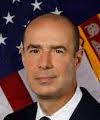
Despite reports last August that Eugene Scalia would recuse himself from taking part in the drafting the Department of Labor’s new fiduciary rule if confirmed as Secretary of Labor, it turns out that Secretary Scalia will take part—despite having helped kill the previous version of the regulation as an attorney for the financial services industry.
As a litigator in private practice two years ago, Scalia represented SIFMA (Securities Industry and Financial Markets Association) the U.S. Chamber of Commerce, and the American Council of Life Insurers in their legal challenge to the Obama-era fiduciary rule, which required retirement account advisors to put clients interests first. The Fifth U.S. Circuit Court of Appeals vacated the rule in March 2018.
Secretary Scalia is the son of the late Associate Justice of the Supreme Court Antonin Scalia.
The DOL’s career ethics attorneys have determined that neither its own ethics rules nor President Donald Trump administration’s ethics pledge precluded Scalia’s involvement in drafting the new rule, according to a reports in the Wall Street Journal and at FinancialAdvisorIQ.com that identified the source as Kate O’Scannlain, the DOL’s solicitor.
“The new rulemaking is not a ‘particular matter involving specific parties’ and litigation related to a prior rule which the secretary handled while in private practice has ended,” O’Scannlain said in a statement cited by the Journal. She added that the Office of Government Ethics agreed with the DOL’s decision, according to the Journal.
Consumer advocates disagreed. “This is a totally unacceptable decision that will taint this rule-making thoroughly. Mr. Scalia first defended the brokerage and insurance industry’s right to engage in conflicts of interest that harm retirement savers. Now, he seems eager to engage in his own conflicts of interest,” said Micah Hauptman of the Consumer Federation of America in a statement Wednesday.
“The fact of the matter is he can’t separate his prior work doing the industry’s bidding and the sensitive information about his clients that he learned in his role as their advocate from a future rule-making that would involve the same issues and clients,” he added.
“I don’t know what type of legal gymnastics lawyers had to do to come to such a ridiculous conclusion,” Dennis Kelleher, chief executive of Better Markets, told the Journal. “Everyone can now be highly confident the Department of Labor will propose and finalize a rule that the industry will cheer and retirees will pay the price for.”
When Trump nominated Scalia in August 2019—after Labor Secretary Alexander Acosta resigned amid an outcry over his handling of a plea deal with convicted sex offender Jeffrey Epstein 10 years ago—lawyers said that Scalia’s experience in fighting the DOL’s rule may force him to recuse himself from drafting the new version of the rule.
During his nomination hearing, Scalia told members of the Senate Committee on Health, Education, Labor and Pensions that he would seek advice from ethics officials on whether he can take part in making the new rule but assured them that his previous private-sector work wouldn’t affect his work at the DOL if confirmed.
“I’m not necessarily my clients,” Scalia said at that time, according to the Associated Press. “I will seek to defend them, to vindicate their rights but that doesn’t mean that I necessarily think what they did is proper.” The full Senate confirmed Scalia for the position just days later.

